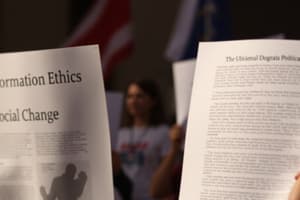Podcast
Questions and Answers
What is one ethical issue raised by information systems?
What is one ethical issue raised by information systems?
- Privacy (correct)
- Physical security
- Environmental impact
- Employment opportunities
Which principle is part of the five moral dimensions of the information age?
Which principle is part of the five moral dimensions of the information age?
- Environmental responsibility
- Economic stability rights
- Information rights & obligations (correct)
- Health and safety rights
What is the main purpose of Nonobvious Relationship Awareness (NORA)?
What is the main purpose of Nonobvious Relationship Awareness (NORA)?
- To enhance social media interactions
- To identify connections to help find criminals or terrorists (correct)
- To analyze financial data for investments
- To improve user experience on websites
How do cookies function in web browsing?
How do cookies function in web browsing?
What risk is associated with the digital divide created by information systems?
What risk is associated with the digital divide created by information systems?
What does profiling in the context of information systems entail?
What does profiling in the context of information systems entail?
What challenge does the information age present politically?
What challenge does the information age present politically?
Which of the following best describes the slippery slope rule?
Which of the following best describes the slippery slope rule?
What is a significant social impact of information systems?
What is a significant social impact of information systems?
Which ethical issue addresses how data is utilized and maintained?
Which ethical issue addresses how data is utilized and maintained?
What does the principle of accountability & control imply in information systems?
What does the principle of accountability & control imply in information systems?
What challenge does profiling raise in terms of ethical considerations?
What challenge does profiling raise in terms of ethical considerations?
How does nonobvious relationship awareness (NORA) enhance data analysis?
How does nonobvious relationship awareness (NORA) enhance data analysis?
Which of the following reflects an ethical concern related to information systems' impact on power dynamics?
Which of the following reflects an ethical concern related to information systems' impact on power dynamics?
What is a primary concern regarding cookies in web technology?
What is a primary concern regarding cookies in web technology?
How does the digital divide manifest in society?
How does the digital divide manifest in society?
Flashcards
Information System Ethical Issues
Information System Ethical Issues
Information systems create intense social change, threatening existing power, money, rights, and obligations. Ethical issues include privacy, accuracy, intellectual property, and accountability related to data collection, use, and protection.
Social Impacts of Information Systems
Social Impacts of Information Systems
Information systems affect jobs, contribute to a digital divide, and influence behavior and culture.
Political Impacts of Information Systems
Political Impacts of Information Systems
Information systems challenge regulation, freedom of speech, cybersecurity, and power dynamics, including concerns about monopolies and misinformation.
Profiling
Profiling
Signup and view all the flashcards
NORA (Nonobvious Relationship Awareness)
NORA (Nonobvious Relationship Awareness)
Signup and view all the flashcards
Cookies
Cookies
Signup and view all the flashcards
Five moral dimensions of the Information Age
Five moral dimensions of the Information Age
Signup and view all the flashcards
Slippery Slope Rule
Slippery Slope Rule
Signup and view all the flashcards
Digital Dossier
Digital Dossier
Signup and view all the flashcards
NORA
NORA
Signup and view all the flashcards
Information Rights and Obligations
Information Rights and Obligations
Signup and view all the flashcards
Property Rights & Obligations
Property Rights & Obligations
Signup and view all the flashcards
System Quality
System Quality
Signup and view all the flashcards
Quality of Life
Quality of Life
Signup and view all the flashcards
Study Notes
Ethical, Social, and Political Issues Raised by Information Systems
- Information systems create opportunities for social change, potentially disrupting existing power structures, finances, rights, and obligations.
- Ethical concerns arise regarding privacy, accuracy, intellectual property, and accountability in data collection, use, and protection.
- Societal impacts include job displacement, the digital divide, and influence on behavior and culture.
- Politically, these systems challenge regulations, freedom of speech, cybersecurity, and power dynamics, with concerns about monopolies and misinformation.
- Balancing innovation with fairness, security, and ethical responsibility is crucial.
Five Moral Dimensions of the Information Age
- Information rights and obligations.
- Property rights and obligations.
- System quality.
- Quality of life.
- Accountability and control.
Profiling
- Profiling is the use of computers to combine data from multiple sources to create detailed information dossiers on individuals.
Nonobvious Relationship Awareness (NORA)
- NORA is a data analysis technology that enhances profiling capabilities.
- It combines data from various sources (e.g., employment applications, phone records, customer lists) to identify relationships and potential criminal activity.
Ethical Choices and Decision-Making
- Responsibility involves accepting the implications of actions taken.
- Accountability ensures that mechanisms are in place to determine who is responsible for actions.
- Liability refers to legal recourse for damages caused by actions or inactions.
- Due process ensures laws are known and understood, providing recourse to appeal decisions.
Slippery Slope Rule
- It suggests that if an action cannot be repeatedly justified, it shouldn't be taken at all.
- It cautions against the gradual progression of potentially negative outcomes.
Cookies and Web Beacons (Tracking)
- Cookies are small text files stored on a computer to track user activity on a website.
- Website software uses cookies to remember past user actions, customize content.
- Web beacons are invisible embedded files in emails or web pages that monitor user behavior.
Copyright
- Copyright legally protects creators' intellectual property for a defined period. (author's life + 70 years)
Patents and Trademarks
- Patents grant exclusive rights to inventions for a set period.
- Trademarks distinguish products or services. (e.g., logos).
Trade Secrets
- Trade secrets protect intellectual property that is unique and confidential.
- Legal protections for trade secrets vary by state.
Studying That Suits You
Use AI to generate personalized quizzes and flashcards to suit your learning preferences.




